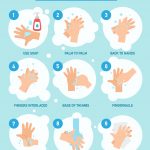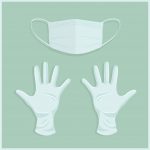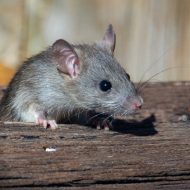Lymphocytic Choriomeningitis (LCM)
Lymphocytic Choriomeningitis (LCM) is caused by a virus called lymphocytic choriomeningitis virus (LCMV). Wild rodents especially the common house mouse, carry this disease. However, only 5% of wild mice in the United States spread LCMV. The virus is found in the pee, spit, and poop of infected* rodents.
Overview
How can I get sick?
- Through contact with fresh pee, poop, spit, nesting materials or any other items from an infected* rodent.
- If these materials are introduced to cracked skin, cuts, nose, eyes, or the mouth then there is a possibility of the virus spreading.
- Direct bite from an infected* rodent.
Symptoms in humans:
Symptoms can occur in two stages and early symptoms show within 10 days to 4 weeks after infection.
Stage 1 (occurs 8 to 13 days after infection) and can last for about a week:
- Fever (when your body gets a little hotter than normal)

- Not feeling good
- Not feeling hungry
- Muscle pain
- Headache
- Feeling like you need to throw up
- Throwing up
Stage 2 (happens a few days after recovering from stage 1):
- Fever (when your body gets a little hotter than normal)

- Headache
- Stiff neck
- Sleepiness
- Confusion
- Sensory disturbances*
- Paralysis (loss of the ability to move some or all your body parts)
- Inflammation of brain
What can I do to stay healthy?
- Stay away from wild rodents and avoid contact with them.
- Take steps to prevent rodent invasion in your home.
- Make sure your pet rodents (mice, hamsters, guinea pigs) do not come in contact with wild rodents.
- After playing with your pet rodents, make sure you always wash your hands with soap and water.
- Proper Handwashing – Wash your hands with soap and running water for at least 20 seconds. Make sure to scrub your thumbs, between your fingers and the tops and bottoms of your hands. Dry your hands with a paper towel.

- Close all possible ways for wild rodents to get into your home.
- Make sure to wear gloves and a mask when cleaning areas where rodents have been (such as in barns or garages).
- Do not stir up dust by vacuuming or sweeping the area.
- Always use cleaning/bleach products on the area you are going to clean.
- Wet the area first and clean with mop, towel, or sponge.
- Make sure to wash your hands carefully.


*Definitions:
- Infected: When germs get inside of a body, animal, or an organism.
- Sensory disturbances: A disorder that may affect your senses such as vision, hearing, taste or smell.
Species Affected

Learn About Other Diseases
Click below to learn more about the many different diseases that can spread between animals and humans.
Diseases
